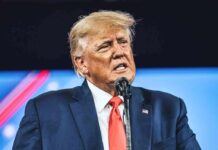The debate over presidential power has heated up with JD Vance’s support of Trump’s use of executive authority raising concerns and critiques over the balance of power in America’s governance.
Quick Takes
- Vice President JD Vance supports Trump’s executive authority.
- Critics argue this stance undermines the judiciary’s role in government.
- Political figures stress the importance of checks and balances.
- The debate raises constitutional questions on the separation of powers.
Vance’s Support Sparks Debate
Vice President JD Vance’s defense of President Trump’s executive power has ignited a contentious debate on presidential authority. Vance argued that the judiciary should not interfere with the executive branch’s legitimate powers, a stance supported by some conservatives. This has led to significant discourse across social media platforms.
Illinois Governor JV Pritzker, along with others, criticized Vance’s position, emphasizing the judiciary’s essential role in maintaining the rule of law. For instance, Pritzker stated, “JD Vance is saying the quiet part out loud: the Trump administration intends to break the law. America is a nation of laws.” His words underscore the mounting tension between executive actions and judicial oversight.
Concerns Over Eroding Judicial Oversight
The criticism from high-profile Democrats like Pete Buttigieg, who asserted, “In America, decisions about what is legal and illegal are made by courts of law. Not by the Vice President,” reflects concerns over potential tyranny and lawlessness. These figures charge that Vance’s support of unchecked executive power could lead to a constitutional crisis, jeopardizing the American tradition of checks and balances.
Comments by Liz Cheney and proponent responses from scholars and commentators, like Kurt Schlichter, show the nation’s polarizing views on executive power’s boundaries. Some accuse Vance of a power grab, while others stress the necessity for strong executive action. Such division demonstrates the ongoing struggle to define the executive role within America’s legal framework.
Implications for Governance and Future Debates
The discourse on executive power, reignited by Vance’s comments, has broader implications for U.S. governance. The divergence of opinion regarding judicial intervention in executive orders highlights a fundamental debate—how to safeguard a balanced power structure while addressing modern political challenges.
Vocal opposition from figures such as Chris Murphy and Adam Schiff illustrates trepidation about an unchecked executive branch. As discussions continue, the emphasis on constitutional adherence remains central to ensuring that no single branch can dominate the governing process. This complex debate is likely to continue influencing political discourse.











